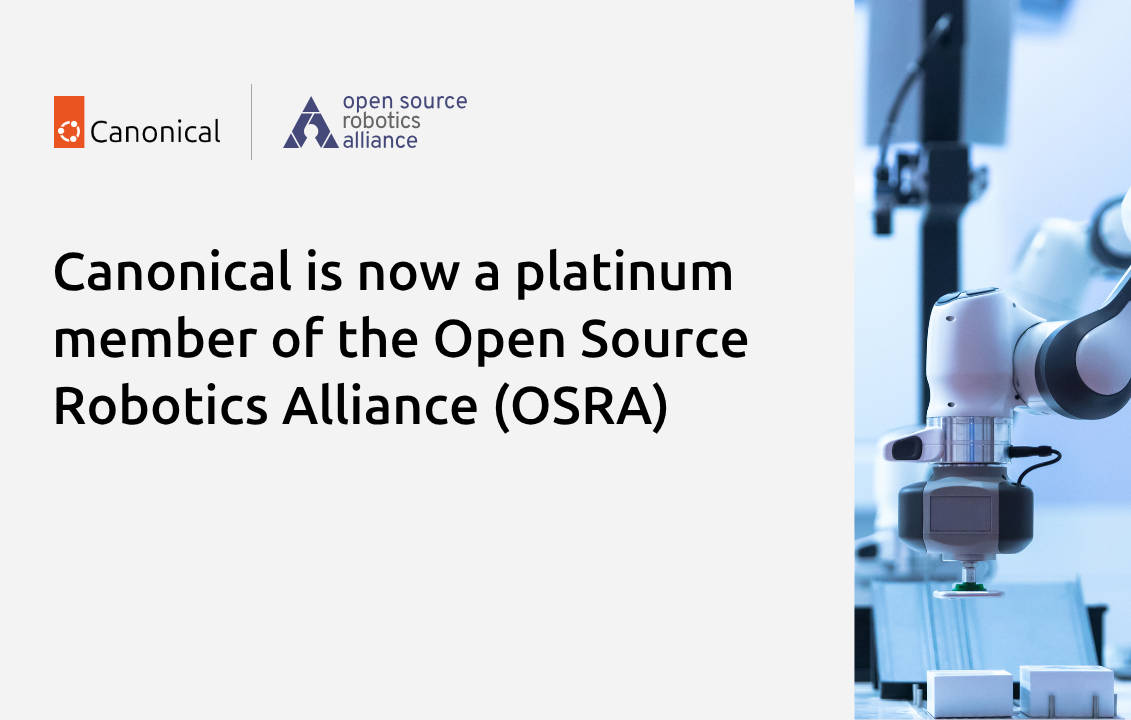Canonical Joins Open Source Robotics Alliance as Platinum Member
- Canonical has become a Platinum member of the Open Source Robotics Alliance (OSRA).
- This move highlights Canonical’s continued commitment to the Robot Operating System (ROS) and open-source robotics.
- OSRA was launched in March 2024 to secure the future of open-source robotics projects like ROS, Gazebo, and Open-RMF.
- Canonical’s Ubuntu remains a Tier-1 platform for ROS 2, supporting major releases like Jazzy and the upcoming Kilted.
Canonical Deepens Commitment to Robotics
Canonical, the company behind Ubuntu, has increased its involvement in the Open Source Robotics Alliance (OSRA) by attaining Platinum membership, the highest level of participation in the alliance. This elevation underscores Canonical’s ongoing dedication to the Robot Operating System (ROS) and the broader open-source robotics ecosystem.
Since the first ROS distribution, Box Turtle, debuted on Ubuntu 8.04 LTS in 2010, Ubuntu and ROS have maintained a close alignment. Each new Ubuntu LTS release is followed by a corresponding ROS distribution, ensuring seamless integration for developers and enterprises deploying robotics solutions on Ubuntu Desktop, Server, and Core.
OSRA: A New Era for Open Source Robotics
The OSRA was established in March 2024 to provide stable, secure, and accessible governance for open-source robotics software, including Gazebo and Open-RMF. The alliance brings together industry leaders and community stakeholders to share responsibility for maintaining and advancing the software that underpins modern robotics. It also enables joint investment in strategic initiatives, such as enhancing security and improving tooling for easier adoption and deployment at scale.
Olivier Philippe, VP of Engineering at Canonical, emphasized the significance of open-source collaboration: “Robotics is evolving rapidly, and we are entering a new phase that will define the next era of automation. Open source has been the foundation of this growth, and ROS will remain central to scaling and deploying advanced robotics worldwide.”
Security and Long-Term Support for ROS
Canonical has played a pivotal role in making ROS production-ready for enterprise use. Through initiatives like Expanded Security Maintenance for ROS (ESM for ROS), Canonical delivers long-term security updates and ensures ROS remains viable for industrial deployments. Ubuntu 24.04 LTS and 22.04 LTS are recognized as Tier-1 platforms for [[LINK:ROS 2]], supporting both current and forthcoming releases, including Jazzy and Kilted.
Canonical’s minimal and secure Ubuntu Core operating system is also used by companies to deploy ROS at scale, meeting industrial standards in sectors such as manufacturing and logistics.
Industry Response and Future Outlook
Geoffrey Biggs, CTO of Open Robotics, noted Canonical’s longstanding contribution: “The choice by Canonical to elevate its membership in the OSRA to the highest level demonstrates that they are serious about supporting open-source robotics in the long term, and are a partner that the OSRF can rely on into the future.”
With more than 15 years of engagement in open-source robotics, Canonical’s strengthened partnership with OSRA reflects its belief in transparent, community-led governance and its commitment to a secure, resilient robotics ecosystem. The company aims to continue supporting the robotics community by ensuring ROS is easy to adopt, secure by design, and backed by long-term support on Ubuntu, the world’s most widely used open-source operating system.
Implications for the Robotics Community
Canonical’s Platinum membership in OSRA is expected to bolster collaborative efforts in the robotics sector, accelerating the development and deployment of open-source robotics technologies. As the industry enters a new era of automation, this move reinforces the role of open source in meeting real-world demands and fostering innovation.
